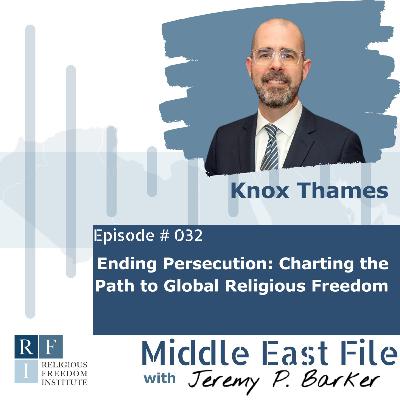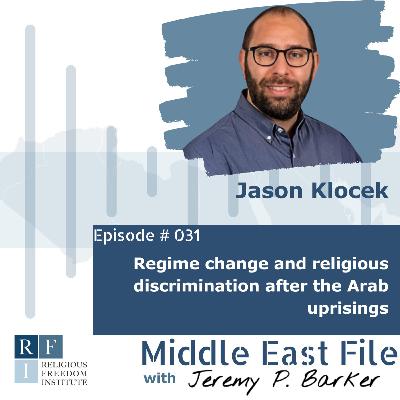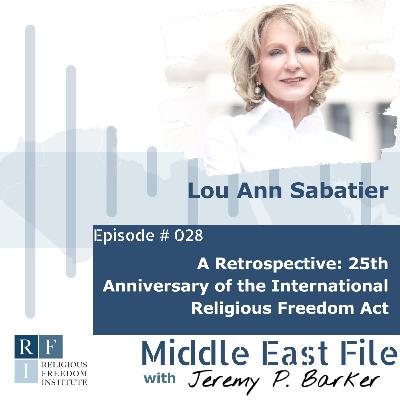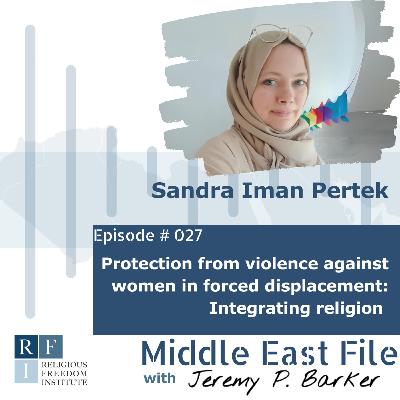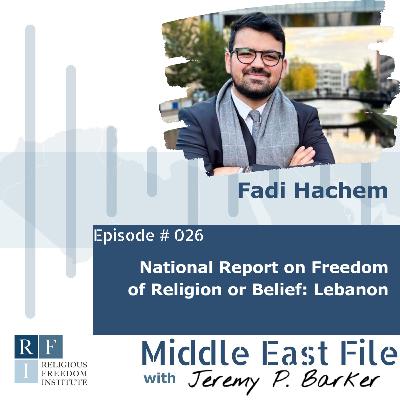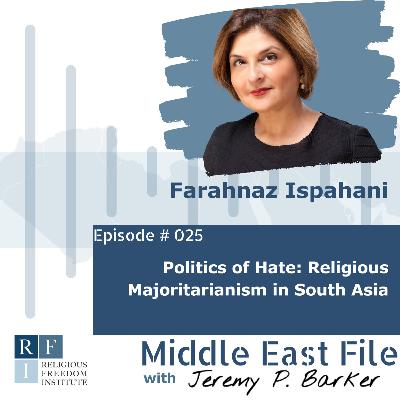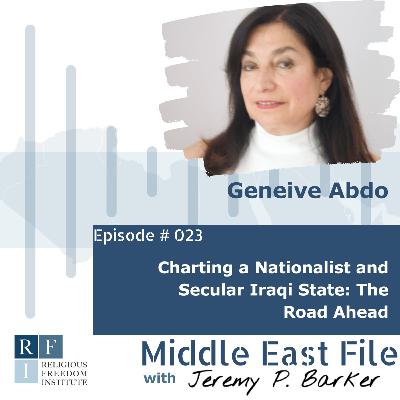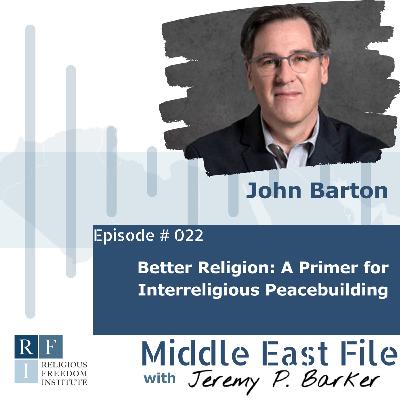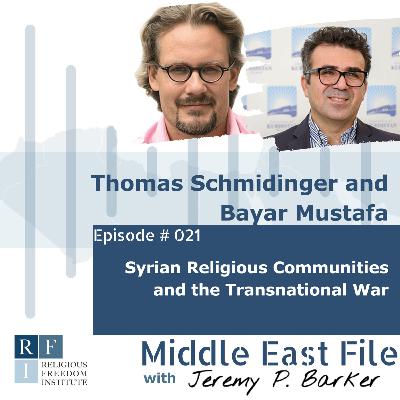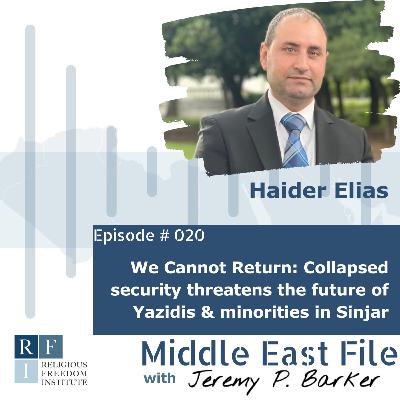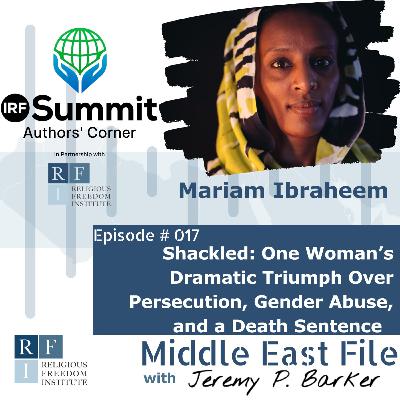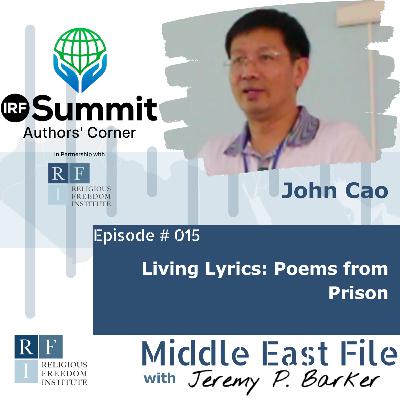Discover Middle East File
Middle East File

32 Episodes
Reverse
Knox Thames is an international human rights lawyer, advocate, and author who has dedicated his career to promoting human rights, defending religious minorities, and combatting persecution. Over his 20 years of service in the U.S. government, Knox held several key positions advocating for freedom of religion or belief, including at the State Department and two different U.S. government foreign policy commissions. Knox has deep experience regarding South/Central Asia, the Middle East, Europe, and U.S. foreign policy relating to human rights. Serving in the Bush, Obama, and Trump administrations, he has worked at the intersection of global affairs, religion, and human rights.
He is the author of Ending Persecution: Charting the Path to Global Religious Freedom (Notre Dame University Press, 2024).
The Middle East File podcast is a publication of the Religious Freedom Institute.
Jason Klocek is an Assistant Professor in Politics and International Relations at the University of Nottingham. He is also a senior researcher at the United States Institute of Peace and a Faculty Affiliate of the University of Notre Dame's Center for the Study of Religion and Society.
In this conversation, we discuss Regime change and religious discrimination after the Arab uprisings, published in the Journal of Peace Research. The article looks at how times of political turmoil and regime change impact experiences of religious persecution. The article tests its findings across Egypt, Libya, Tunisia, and Yemen, four countries that experienced regime change following 2011. The article highlights not only that societal religious discrimination increases, but explores some of the reasons for why this is the case.
The Middle East File is a publication of the Religious Freedom Institute.
Samirah Majumdar is a research associate at the Pew Research Center, where she focuses on global restrictions on religion. She is an alumnus of Barnard College and Georgetown University and the author of multiple Pew Research Center reports, including the latest study: Globally, Government Restrictions on Religion Reached Peak Levels in 2021, While Social Hostilities Went Down.
The Middle East File podcast is a publication of the Religious Freedom Institute.
Mairéad Smith is a consultant with the Coalition for Just Reparations (C4JR) and a PhD candidate at Brown University.
In this conversation we discuss the C4JR Annual Report on implementation of the Yazidi Survivors Law: More than "Ink on Paper": Taking Stock Three Years After the Adoption of the Yazidi [Female] Survivors Law. The report provides an overview of YSL implementation and the work of the General Directorate for Survivors’ Affairs (GDSA) in implementing the YSL, including the latest information on the verification and appeals process, application statistics, and administrative capacity of the GDSA, highlighting challenges that hinder the delivery of benefits in a trauma-informed and survivor-centered manner.
Additional Resources:
More than “Ink on Paper”: Taking Stock two Years After the Adoption of the Yazidi [Female] Survivors Law (C4JR, 2023)
International Protocol on Documenting Violations of Religious Freedom (Religious Freedom Institute and Open Doors, 2022)
Guidance Note: Protecting Vulnerable Religious Minorities in Conflict and Crisis Settings (Religious Freedom Institute, 2020)
The Middle East File podcast is a publication of the Religious Freedom Institute's Middle East Action Team.
Lou Ann Sabatier is a consultant with decades of leadership experience in non-profit and corporate publishing, marketing and communications. She has worked with clients including World Vision/Save the Children, the International Monetary Fund, the OECD, the Federal Reserve Bank, National Geographic, the U.S. Marine Corps, and the Chronicle of Higher Education. She also currently serves as Director of Communications for 21Wilberforce and in 2021 cofounded the FoRB Women's Alliance.
In this conversation, we discuss A Retrospective: 25th Anniversary of the International Religious Freedom Act. The retrospective looks back on the stories, people, successes, and challenges of the past 25 years, considering not only the legislation and policy, but the broader IRF movement in the United States and around the world.
Additional Resources:
IRFA 20TH ANNIVERSARY RETROSPECTIVE (21Wilberforce)
The First 25 Years: IRFA Accomplishments and Next Steps (USCIRF)
Surveying the Landscape of International Religious Freedom Policy (Religious Freedom Institute)
The Middle East File podcast is a publication of the Religious Freedom Institute's Middle East Action Team.
Dr. Sandra Iman Pertek is a ESRC Postdoctoral Fellow at the University of Birmingham. She is a gender and social development specialist with over a decade’s experience in humanitarian, development, and migration settings. Her research integrates intersectional and ecological approaches for developing religious engagement with the continuum of violence in forced migration.
In this conversation, we discuss her recent policy brief on the relevance of religion as both a potential factor of vulnerability and a source of resilience in settings of conflict.
For additional resources see:
Pertek, S., Block, K., Goodson, L., Hassan, P., Hourani, J. and Phillimore, J. (2023) Gender-based violence, religion and forced displacement: protective and risk factors. Frontiers in Human Dynamics (5):1058822.
Pertek, S.I. (2022) God Helped Us: Resilience, Religion and Experiences of Gender-Based Violence and Trafficking among African Forced Migrant Women. Social Sciences. 11 (5): 201. doi:10.3390/socsci11050201
Shah, Rebecca, Timothy Shah, Nathan Berkeley, Jeremy Barker, and Samuel Basden. “Guidance Note: Protecting Vulnerable Religious Minorities in Conflict and Crisis Settings.” Religious Freedom Institute, 2020.
Sabates-Wheeler, R., & Barker, J. P. (2024). The place of religious inequalities within international development and humanitarian response frameworks: Lessons from Iraq. World Development, 173(106417), 1–11. https://doi.org/10.1016/j.worlddev.2023.106417
The Middle East File podcast is a publication of the Religious Freedom Institute's Middle East Action Team.
Fadi Hachem is a human rights lawyer and researcher specializing in Gender and Cultural Rights. He has worked as a consultant and advisor with a number of local and international organizations, including ALEF - Act for Human Rights, the International Commission for Missing Persons, ACTED, Konrad Adenauer Stiftung, UNICEF, and Pax for Peace.
Fadi served as the editor and coordinator of this research report, as part of Search for Common Ground's project on FoRB Roundtables in Lebanon. The National Report on Freedom of Religion and Belief was produced by the National Working Group on FoRB in Lebanon and includes contributions from more than 18 organizations and individuals covering a wide range of topics.
The Middle East File podcast is a publication of the Religious Freedom Institute's Middle East Action Team. For more of their work, including recent articles, publications, and events, sign-up for the Middle East File email.
Farahnaz Ispahani is a Senior Fellow at the Religious Freedom Institute and joins to discuss her new book: Politics of Hate: Religious Majoritarianism in South Asia (Harper Collins, 2023).
South Asia-home to almost 2 billion people representing every major and minor religious belief-has also witnessed religious extremism, often supported by the state apparatus.
In Politics of Hate, noted scholars-experts on the subject and the region discuss their research on the role of the media and political leaders in deploying hatred for political advantage, covering developments in India, Bangladesh, Pakistan and Sri Lanka. In an era of media incitement, orchestrated attacks on mosques, churches, and temples, and identity politics, this book serves as a timely study of the phenomenon of politically motivated religious and ethnic division.
Farahnaz Ispahani has been a leading voice for women and religious minorities in Pakistan for the past twenty-five years, first as a journalist, then as a member of Pakistan's National Assembly, and most recently as a scholar based in the United States. As a Senior Fellow at the Religious Freedom Institute and advisor and consultant to numerous other initiatives, she works at the intersection of human rights, freedom of religion or belief, and the US policy world. She is on Twitter: @FIspahani
The Middle East File podcast is a publication of the Religious Freedom Institute's Middle East Action Team. For more of their work, including recent articles, publications, and events, sign-up for the Middle East File email.
David H. Warren, lecturer in the Jewish, Islamic, and Middle Eastern Studies department at Washington University in St. Louis, joins to discuss a new report: Tolerance, Religious Freedom, and Authoritarianism (USCIRF, 2022).
This report details how authoritarian states promote religious tolerance without necessarily ensuring freedom of religion or belief. It distinguishes between these two concepts and explains the origins of religious tolerance promotion as a tool of statecraft. The report then presents case studies of countries engaged in religious tolerance promotion, such as Azerbaijan, Bahrain, Saudi Arabia, United Arab Emirates, Egypt, Jordan, Kazakhstan, Qatar, Russia, and Uzbekistan.
David H. Warren is a scholar of contemporary Islam, politics, and media in the Middle East, with a particular focus on the understudied Arab Gulf states and Islamic soft power. His first book, Rivals in the Gulf: Yusuf al-Qaradawi, Abdullah Bin Bayyah, and the Qatar-UAE Contest Over the Arab Spring and the Gulf Crisis (Routledge 2021) investigated the political interventions of two of the most prominent figures among the Muslim scholarly-elite (the ulama) and their relationships with the Qatari and Emirati ruling families. The project included fieldwork in Doha and Abu Dhabi and qualitative analyses of media platforms ranging from satellite TV interviews, to YouTube sermons, to Twitter feeds.
The Middle East File podcast is a publication of the Religious Freedom Institute's Middle East Action Team. For more of their work, including recent articles, publications, and events, sign-up for the Middle East File email.
Geneive Abdo is a Fellow in the Middle East Program of the Wilson Center and joins to discuss a new report: Charting a Nationalist and Secular Iraqi State: The Road Ahead (EPIC / Konrad Adenauer Stiftung, 2022).
Young people are changing Iraq. But what kind of state do they want? The report covers the results of a national survey conducted by EPIC of 1,062 eligible Iraqi voters ages 18 – 40 on their views toward religion and a secular state.
Geneive Abdo is a visiting fellow at the Arab Gulf States Institute in Washington and a consultant at the World Bank. She was most recently a visiting fellow at the Brookings Doha Center. Her current research focuses on the shifting political and religious alliances within Shia communities in the Middle East. She has worked at several Washington-based think tanks, including the Atlantic Council and the Stimson Center. She was a non-resident scholar at the Brookings Institution from 2013-17. She was also a lecturer at the Elliott School of International Affairs at the George Washington University from 2016-19.
Among her vast publications, including monographs and works in scholarly journals, Abdo is the author of four books on the Middle East, including The New Sectarianism: The Arab Uprisings and the Rebirth of the Shi’a-Sunni Divide (Oxford University Press, 2016). Her other books, also published by Oxford, include a groundbreaking study of the Muslim Brotherhood’s rise to power in Egypt.
The Middle East File podcast is a publication of the Religious Freedom Institute's Middle East Action Team. For more of their work, including recent articles, publications, and events, sign-up for the Middle East File email.
John D. Barton, Professor of Teaching of Religion and Director, Center for Faith and Learning, Pepperdine University joins to discuss his new book Better Religion: A Primer for Interreligious Peacebuilding (Baylor University Press, 2022).
In the twenty-first century, humanity faces both unprecedented existential threats and remarkable possibilities for development. While no one knows how things will unfold by century's end, it is increasingly clear that religion will play a major role in shaping the outcomes, for better or worse. In Better Religion, philosopher and religion scholar John Barton explores how grassroots interreligious peacebuilding can help ensure the "better."
Written for academic and professional audiences, this "conceptual primer" will equip readers to understand religion in the twenty-first century and pursue constructive collaborations for human flourishing, all for the sake of the world we currently share and the world we want our grandchildren to inherit. Read More
---
To learn more about the Religious Freedom Institute and find more of the Middle East File podcast visit: https://www.religiousfreedominstitute.org/middle-east
Bayar Mustafa Sevdeen, Dean of External Engagement and Research at the University of Kurdistan Hewler and Dr. Thomas Schmidinger Lecturer at the University of Vienna and a Visiting Professor Politics & IR at University of Kurdistan Hewler join to discuss the recent conference Syrian Religious Communities and the Transnational War.
The conference brought together a wide range of contributors from within Syria and internationally to understand the diverse experiences of religious communities throughout the more than 11 years of conflict in Syria.
The conference was jointly organized by the Center for Peacebuilding and Dialogue (CPD) at the University of Kurdistan Hewlêr (UKH), in collaboration with Socialists and Democrats Group (S&D) at the European Union Parliament, and the Religious Freedom Institute (USA).
Livestream:
Conference Part 1 (Video)
Conference Part 2 (Video)
Conference Part 3 (Video)
Conference Part 4 (Video)
Haider Elias, President, Yazda, joins the Middle East File to discuss We Cannot Return: Collapsed Security Threatens the Future of Yazidis & Minorities in Sinjar co-authored by Yazda and The Zovighian Partnership and published by the Wilson Center.
This first paper in a two-part series presents and recommends immediate solutions to strengthening security in Sinjar. Published by the Wilson Center, the series aims to equip national and international stakeholders with community-led and actionable recommendations to enable political support for all minority communities in Sinjar.
Related:
Engaging with Religious Inequality in Humanitarian Response: A Case Study from Iraq 2014–2019
“State Responsibility and the Genocide of the Yazidis” (Report)
Iraq: Stabilising the Contested District of Sinjar
Ismail Royer, Director of the Islam and Religious Freedom Action Team at the Religious Freedom Institute, joins the Middle East File to discuss his / Islam in the Constitutions of Modern Arab States: the Case of Tunisia.
The article is part of a Cornerstone Forum series looking at the implications of Tunisia’s new constitution on religious freedom, associated rights, governance, and stability. Ismail’s piece particularly looks at the history and meaning of the concept of maqasid ash-sharia (aims and purposes of law), where concerns over this concept come from, and how this concept could relate to contemporary developments in Tunisia.
Related:
The Evolution of Individual Rights and Religious Freedom Following the Arab Spring Movement in Tunisia
Implications of the Role of Religion in Tunisia’s New Constitution for Non-Muslims Movement in Tunisia
Implications of Tunisia’s New Constitution on Religious Freedom, Associated Rights & Governance
Nury Turkel is the author of No Escape: The True Story of China’s Genocide of the Uyghurs (Hanover Square Press, 2022) and is interviewed by Jeremy P. Barker, Director, Middle East, Religious Freedom Institute.
Nury Turkel is an attorney, author, foreign policy expert, and advocate with nearly two decades of experience working in the intersection of law, business, government, and the human rights community. He specializes in corporate governance and regulatory compliance, national security, foreign policy, digital authoritarianism, and forced labor and supply chain risk issues. He is currently serving as Chair of the US Commission on International Religious Freedom after being appointed as a Commissioner by Speaker of the House Nancy Pelosi in May 2020.
Hosted in partnership with the Religious Freedom Institute (www.RFI.org), the IRF Summit Authors' Corner took place at the IRF Summit 2022 (www.IRFsummit.org) in Washington, D.C. and featured interviews with authors on a range of books related to religious freedom issues around the globe.
See more interviews here: IRF Summit Authors' Corner
Purchase books here: IRF Summit Authors' Corner (Bookshop)
Mariam Ibraheem is the author of Shackled: One Woman’s Dramatic Triumph Over Persecution, Gender Abuse, and a Death Sentence (Whitaker House, 2022) and is interviewed by Jeremy P. Barker, Director, Middle East, Religious Freedom Institute.
Mariam Ibraheem is Co-founder and Director of Global Mobilization for Tahrir Alnisa Foundation. Mariam was imprisoned for her faith in December 2013 before later being sentenced to death on charges of apostasy and adultery. Mariam was imprisoned with her young son and ultimately would deliver her daughter in prison before ultimately being released. She remains a passionate advocate for the persecuted and oppressed around the globe.
Hosted in partnership with the Religious Freedom Institute (www.RFI.org), the IRF Summit Authors' Corner took place at the IRF Summit 2022 (www.IRFsummit.org) in Washington, D.C. and featured interviews with authors on a range of books related to religious freedom issues around the globe.
See more interviews here: IRF Summit Authors' Corner
Purchase books here: IRF Summit Authors' Corner (Bookshop)
Bob Fu is the author of The Politics of Inclusive Pluralism: Proposed Foundation for Religious Freedom in a Post-Communist, Democratic China (Pickwick, 2020) and is interviewed by Todd Huizinga, Senior Fellow for Europe, Religious Freedom Institute.
Bob Fu is the founder/president of China Aid and dedicates himself to advancing religious freedom for all in China. He earned his PhD in the field of religious freedom from the University of Durham. He is editor-in-chief of the Chinese Law & Religion Monitor Journal.
Hosted in partnership with the Religious Freedom Institute (www.RFI.org), the IRF Summit Authors' Corner took place at the IRF Summit 2022 (www.IRFsummit.org) in Washington, D.C. and featured interviews with authors on a range of books related to religious freedom issues around the globe.
See more interviews here: IRF Summit Authors' Corner
Purchase books here: IRF Summit Authors' Corner (Bookshop)
Pastor John Cao is author of Living Lyrics: Poems from Prison (China Aid, 2021) and Julian Marley of China Aid is interviewed by Jeremy P. Barker, Director, Middle East Action Team, Religious Freedom Institute.
Living Lyrics is a collection of prison poems written by Pastor John Cao. Cao received a seven-year prison sentence in March 2018 for his Christian faith. Cao, a legal resident of North Carolina, made many trips to his native China for humanitarian work before his detention in March 2017. Those observing Cao's case believe his imprisonment is part of the ongoing campaign by the Chinese government to suppress the church. Inside Living Lyrics is a collection of Pastor Cao's prison poetry in both English and Chinese, alongside photos and information about his life and work. Each poem is a testimony to Pastor Cao's exemplary faith, heart for the Gospel, and his commitment to take up the cross of discipleship even in the face of immense persecution.
Hosted in partnership with the Religious Freedom Institute (www.RFI.org), the IRF Summit Authors’ Corner took place at the IRF Summit 2022 (www.IRFSummit.org) in Washington, D.C. and featured interviews with authors on a range of books related to religious freedom issues around the globe.
See more interviews here: IRF Summit Authors' Corner
Purchase books here: IRF Summit Authors' Corner (Bookshop)
Mustafa Akyol is author of Why, As a Muslim, I Defend Liberty (Cato Institute, 2021) and is interviewed by Jeremy P. Barker, Director, Middle East Action Team, Religious Freedom Institute.
Mustafa Akyol is a senior fellow at the Cato Institute’s Center for Global Liberty and Prosperity, where he focuses on the intersection of public policy, Islam, and modernity. Since 2013, he has also been a contributing opinion writer for the New York Times, covering politics and religion in the Muslim world. He is the author of Reopening Muslim Minds: A Return to Reason, Freedom, and Tolerance (2021), The Islamic Jesus: How the King of the Jews Became a Prophet of the Muslims (2017), and Islam without Extremes: A Muslim Case for Liberty (2011).
Hosted in partnership with the Religious Freedom Institute (www.RFI.org), the IRF Summit Authors’ Corner took place at the IRF Summit 2022 (www.IRFSummit.org) in Washington, D.C. and featured interviews with authors on a range of books related to religious freedom issues around the globe.
See more interviews here: IRF Summit Authors' Corner
Purchase books here: IRF Summit Authors' Corner (Bookshop)
Ewelina U. Ochab and David Alton are the authors of State Responses to Crimes of Genocide: What Went Wrong and How to Change It (Springer Nature, 2022) and are interviewed by Jeremy P. Barker, Director, Middle East Action Team, Religious Freedom Institute.
Ewelina Ochab is a human rights advocate, author, and co-founder of the Coalition for Genocide Response. She works on the topics of genocide, persecution of minoriites around the world, with primary projects including Daesh genocide in Syria and Iraq, Boko Haram atrocities in West Africa, atrocities against the Uyghurs, the situation of the Rohingyas, among others.
Lord David Alton served for 18 years as a Member of the House of Commons and now serves as an Independent Crossbench Life Peer in the UK Parliament. He has been a stalwart advocate for human rights around the world bringing international attention to some of the most grave abuses.
Hosted in partnership with the Religious Freedom Institute (www.RFI.org), the IRF Summit Authors' Corner took place at the IRF Summit 2022 (www.IRFsummit.org) in Washington, D.C. and featured interviews with authors on a range of books related to religious freedom issues around the globe.
See more interviews here: IRF Summit Authors' Corner
Purchase books here: IRF Summit Authors' Corner (Bookshop)


